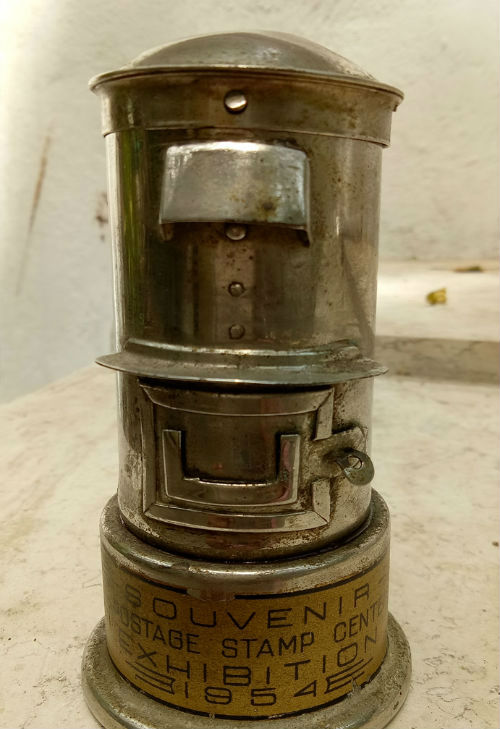Registered with the Registrar of Newspapers for India under R.N.I 53640/91
Vol. XXVII No. 13, October 16-31, 2017
A Postal Service family
Pushpa Chari

Set in a wildly overgrown garden filled with ‘nagalingam’ trees over which purple bougainvillea ran amok, the post office on Poonamallee High Road that I walked into on a stamp-buying spree seemed to be from another time – and in a magical space of its own! A walk past an ancient stone garden seat led to a crumbling annexe building where you could see a minutely carved and cracked wooden staircase curving up. Adjacent to it was the post office itself with its peeling verandah walls sporting embossed English rose ceramic tiles, its floor a perfectly preserved Athangudi tiled surface good enough to dance on! I was transfixed by this coming together of ancient beauty and the resonance of “days long gone by of not returning time” and I remember thinking what a wonderful backdrop the post office building would make to tell the 150-year-old story of Indian Posts (and, once, Telegraphs) and the many stories within that story. Waiting for my turn in the queue I closed my eyes and imagined the old ‘daak palanquins’ chugging up the driveway and Kipling’s “brave brawny daak runner”, running full speed to deliver the post. Remember Kipling’s postman hero, the man who ran in the Himalayas:
“From rose oak to fir,
From rice fields to rock edge,
Flew the soft sandaled feet,
Up through the night,
Of the overnight mail.”

P. Ananthacharlu

P.A.Krishnamacharlu.

P.K.S. Chari.
Which brings me to my own story. Of a Madras family, in fact my late husband Col. P.S. Gopalachari’s family, whose ancestors’ lives and fortunes were intertwined with the first hundred years of the Posts and Telegraph service in Madras. Beginning with his great-great-great-great grandfather Rai Bahadur Cham Iyengar to great-grandfather, to grandfather to father, it was a family which not only served the Indian Posts and Telegraphs in positions of power but helped script its narrative.
How well I recall entering my in-laws’ home for the first time and seeing the living room wall covered with huge sepia-toned daguerreotypes and photographs of some of these worthies, resplendent in their Brahminical turbans, their official designation in the postal department neatly written below the photographs. It was under their benevolent gaze that my fiancé showed me his priceless stamp collection, inherited from these ancestors, albums full of more than 100-years-old, beautifully coloured and fancifully shaped stamps of India and its erstwhile exotic ‘native’ states, stamps of foreign countries many of which had fallen off the map, down to the first stamp issued in the world, the English penny black…
Cham Iyengar was Paymaster General of the East India Company in the last years of the 18th Century. A position of power and pelf which, according to family lore, entailed travelling in his coach and four with a runner to see that letters and salaries were delivered with care. He was later honoured with the title of Rai Bahadur for his services to the Raj. His grandson, my husband’s great-grandfather P. Ananthacharlu’s beautifully calligraphed will mentions that he was a Superintendent in the Madras Postal Department. He bought properties in ‘Black Towne’, over one of which he flew his own flag. His invitation card to his grandson P.A. Krishnamacharlu’s wedding in 1888 was couched in perfect elegant English, indicating that he had arrived in society. Incidentally, his houses in Black Town were inherited 150 years later by my husband and his brothers, complete with exquisitely carved doors and stained-glass windows.
P. Ananthacharlu’s grandson – my husband’s grandfather – Rao Bahadur Krishnamacharlu was the first Indian Deputy Postmaster General of Madras Presidency. He was a prominent member of society and photographs of the time show him hobnobbing with English gentry and prominent Indians such as C.P. Ramaswari Aiyar. His son – my husband’s father – P.K.S. Chari retired as Postmaster General of Madras State in 1958. It was during his tenure that the Indian Posts and Telegraphs celebrated its centenary with much pomp and ceremony.
A prominent event of the centenary was the inauguration of the ‘new’ Post and Telegraphic office in Mount Road by my father-in-law P.K.S. Chari, an event which was recorded in a marble plaque embedded at the entrance of the new Posts & Telegraphs office. The plaque remained there till 2001 when it was removed and put away to make way for renovation. My persistent enquiries to trace it were met with blank looks and shrugs… so much for our sense of history and documentation. However, I still have in my possession a beautiful centenary memento, a perfect hand-tooled replica of a post box complete with every minute detail which bears the legend “India Postage Stamp Centenary Exhibition 1954” (above). A perfect piece of handcraft, it evokes the 100-years-old history of the postal services and the Madras family which played a role in it.


Interesting read, this. I looked up because i am trying to trace my ancestors. My father- a telugu brahmin was born in Kollengode -now in Kerala. He died when i was 16 so the trail peters off. I remember him telling me that my grandfather worked as a postmaster. My father was born around 1917. Can i get records of those who worked here at around the period of 1880??
Such an interesting and intriguing article. While I have frequented the above mentioned post office many a times, I have only been fearful of the collapsing walls and scarred window frames. While the atmosphere of the dense shrubs and overhanging branches of huge canopies of the trees gave a mysterious and menacing feeling, it never struck me as it did to the imaginative author that it formed an ideal background to our own unique and hardy Indian Posts (& Telegraph). If only the Indian Government paid a little more attention to the historic value of our time tested institutions !!
Is PSK chari related to the writer?